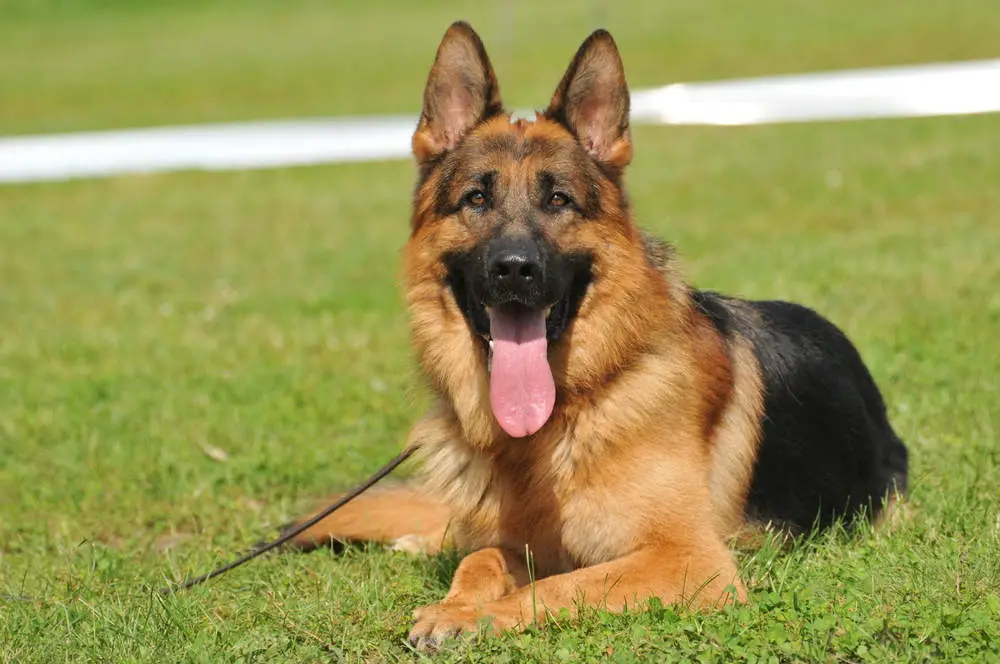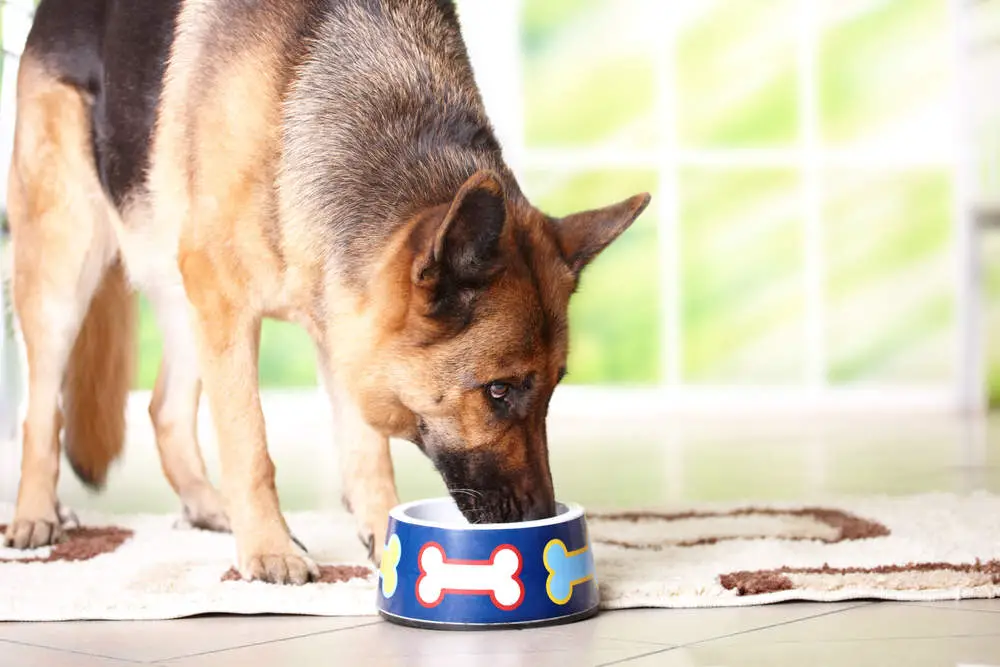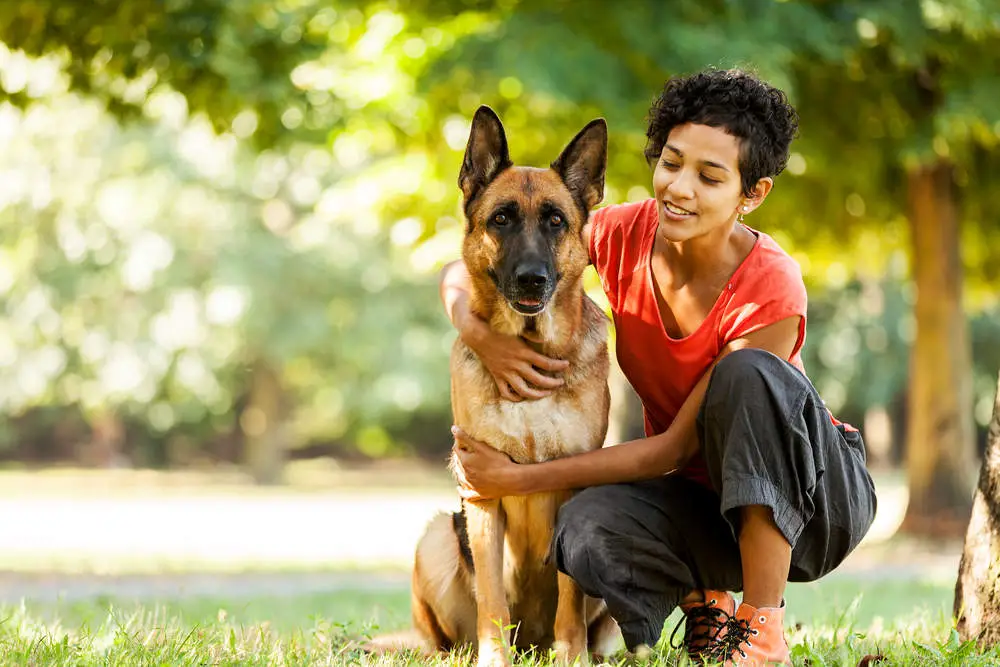
The German Shepherd is a herding dog often referred to as the canine superstar because of its ability to perform a range of roles from being a brilliant security dog to a friend to the average family. It is basically the Meryl Streep of herding dogs.
In the US alone, it is the second most popular breed but world over, German Shepherds are quite the hot favorite. If you want to get one for yourself, here’s a profile you absolutely must read.
German Shepherd: At a Glance
- Height: 22 to 26 inches
- Weight: 60 to 100 pounds
- Group: Herding
- Coat: Coarse double coat, medium length.
- Coat Color: Black and tan, black and red, black and cream, black and silver, solid black, gray, sable
- Life Span: 9 to 13 years
The Origin Story
The beginnings of the German Shepherd dog can be traced back into the distant past as their ancestors have been excellent companions to human beings for a really long time now. German Shepherds or GSDs were first introduced in Germany. No surprises there.
This mix of farm dogs and old shepherd dogs first arrived on the scene in 1899. For a brief period of time during the World Wars, they were referred to as Shepherds (because, you know, the “German” tag was bad for business).
They were also called Alsatians, which is a name some use even today. But German Shepherds became popular in the 1900s and were recognized by the American Kennel Club in 1908.
Ranking second in their listings, this is an extremely popular breed.
Learn more about German Shepherds with these articles:
- When Do German Shepherd Ears Stand Up?
- Can German Shepherds Have Dwarfism?
- When Do German Shepherds Stop Teething?
- 36 Adorable German Shepherd Mix Breeds with Pictures
- King Shepherd vs German Shepherd: What’s the Difference?
- Anatolian Shepherd vs German Shepherd: Which Breed Is Right For You?
- Why Do German Shepherds Have Moles?
Temperament and Behavior
If you’re going to get a dog, this is the first thing to learn about their breed. GSDs can be fairly large in size but they are good with children and other pets provided they are socialized well and early.
That makes them great family dogs but German Shepherds are also excellent watchdogs which means you can count on their instincts especially with strangers. German Shepherds are pretty intelligent which makes it easy for you to train them.
When you find a German Shepherd nervous or high strung, you can safely assume that they were badly bred. So, if you are getting a German Shepherd from a breeder, be sure to check their reputation.
It is not uncommon to worry about living with a dog with aggressive instincts. So the thing to learn about German Shepherds right away is that if you guard them too much and not allow socializing or don’t train them properly, bad behavior is kind of inevitable.
The advantage of an intelligent dog is that you can teach them a lot of things and they will retain all of it quite well. In that sense, taking your German Shepherds to obedience school is a very good idea.
These dogs do very well when they are with a family and have been socialized early enough to know how to behave around humans and other pets. Leaving them in a kennel or a backyard all to themselves is not a great idea even if there are other dogs to keep them company.
These are also active dogs and love nothing more than a task to complete. But we’ll get to their workout details in a minute.
Learn more about German Shepherd Temperament and Behavior with these articles:
- Are German Shepherds Good With Cats?
- How High Can a German Shepherd Jump?
- Can German Shepherds Be Left Home Alone?
Nutrition and Diet Specification

Since they are active dogs, you must pay special attention to their dietary needs. High-quality food that is age appropriate is a must. They need a lot of nutrients and bad quality can upset their stomach.
If you’re going to cook for them, make sure food with lots of fat and cooked bones are avoided. For treats, dog kibble and pieces of biscuit are just fine.
Since the food covers vitamins and minerals, you can give your German Shepherd small portions of cooked veggies, eggs and yogurt. And once in a while, check with the vet if you need to make any revisions to the diet to meet the height and weight requirements.
When looking for food, make sure you get something that is meant for large dogs that have a good appetite and do lots of exercises. As they grow, their needs will change which means you need to consult the vet about it.
They grow rapidly from four to seven months of age. So, that’s a critical time to stay on top of their dietary needs.
It is also the time when a lot of German Shepherds develop bone problems. So, the mantra is to keep it high quality but low in calories.
Health Problems
Speaking of bone issues, German Shepherds are generally healthy dogs but they are prone to some problems like many other breeds. If you want to get a German Shepherd or already have one, these are some issues to watch out for.
Elbow Dysplasia: This one is quite common among large dogs and is hereditary. It is caused when the three elbow bones grow at different rates.
It causes a lot of pain in their joints to the point that their movement might suffer. Medication can control the pain and surgery might be helpful.
Hip Dysplasia: This is another hereditary condition and it occurs when the femur does not fit in the pelvic socket which is located in the hip joint.
The trouble with this disorder is that you might not even see any symptoms. Sometimes, it leads to pain in the rear legs. This can lead to arthritis with age.
Degenerative Myelopathy: This disease affects the spinal cord and in turn causes communication problems between the brain and the hind legs of the dog.
That’s why German Shepherds with this disease have trouble moving their hind legs in coordination with the rest of their body. It cannot be treated but sometimes vitamin supplements have been seen to help the dog.
Gastric Dilatation-Volvulus: This condition is also called bloat and if affects large dogs that can eat and drink quickly and exercise right after a meal. So their stomach gets filled with air and they can’t get rid of it through belching or vomiting.
You will notice that the blood pressure drops and the dog goes into shock. This is a dangerous condition and can lead to death.
Exocrine Pancreatic Insufficiency: This is another genetic health condition that attacks the dog’s pancreas. This condition damages the cells that help secrete digestive enzymes in your dog.
You will notice that your GSD has trouble absorbing and digesting food. Symptoms include loss of appetite, losing weight, changes to stool and gas. Your GSD is likely to become thin but will remain hungry. Medication is usually enough for the dog to recover.
You should also be on the lookout for allergies ranging from contact to food. Scratching, rubbing their face and licking it excessively are all signs of an allergy.
About Training
As mentioned before, since these are active dogs with the tendency to get aggressive, puppy training is mandatory. You must also take them to obedience classes to help them adapt to their immediate environment and turn them into well-behaved dogs.
Make sure you keep the training based on positive reinforcement and you will see extraordinary results because they are hard workers. Rewards are a must as is the case with every breed of dog.
German Shepherds have a strong bond with the family they are with. So, keep them close and make them a part of your activities.
Grooming Needs
You are going to have to keep some time aside to make sure your German Shepherd is well groomed. GSDs need to be groomed at least two times a week.
They shed heavily all through spring and fall. So, at that time of the year, you have to do it every day.
You are going to need a deshedding or dematting tool, a slicker brush and a bristle brush. You are also going to need a vacuum cleaner to keep your house fur-free.
Since these dogs have a double coat, you need something to reach and brush the undercoat too. But the easiest way to keep your home fur-free is to do this outside the house.
How to Care for a German Shepherd

If we’re talking about physicality, make sure your German Shepherd’s nails are clipped so that they can move comfortably. It’s also a good idea, in general, to do that for a watchdog.
When it comes to dental hygiene, make sure you brush your canine’s teeth a couple of times every week. They have some serious jaw strength so get them strong chew toys.
If they seem aggressive or anxious, you might have to go back to their training basics. German Shepherds love a task and are intelligent dogs which means training is actually fun for them.
If they seem strangely detached from strangers, you might want to pay attention because it means they are suspicious of the person in question.
German Shepherds are excellent protectors when socialized early which makes them a perfect fit for households with fitness lovers. They are pretty great with kids too once you get them accustomed.
GSDs love and need exercise regularly. They make for great running mates so take them with you.
They also tend to get frustrated when there is nothing to do and end up chewing on furniture, digging in the neighborhood or barking for no reason. That’s a lot of energy that isn’t getting released.
They do tend to chase smaller animals so socializing in that sense is critical if you have other pets. Strange dogs of the same sex can also be a problem which means you need to be careful when you’re outdoors.
You might be able to make do with a German Shepherd in an apartment if you give them a ton of exercise but ideally, they are meant for homes with a yard.
Learn more about caring for a German Shepherd with these articles:
- Can German Shepherds Swim?
- Do German Shepherds Like to Play Fetch?
- 7 Common German Shepherd Tail Problems and What You Can Do
Pros and Cons of Getting a German Shepherd
There are a lot of advantages and some disadvantages to this breed. Take a look.
Advantages
- GSDs live for nine to 13 years of age which is relatively long. It depends on whether they have healthy genes but if you take good care of them, you will have a long and happy life together with them.
- They come in many different colors. Just officially German Shepherds are recognized in 11 color variations although the black and tan combination is pretty popular.
- German Shepherds have a ton of energy and are great companions in case you have children who like to run around the house. They can also be very entertaining which makes them great pets. Since they are extremely active, they are also good companions when you are outdoors.
Disadvantages
There are a couple of things to look out for when getting a dog of this breed.
- They have a coarse double coat which leads to a lot of shedding especially close to summer and start building it back when it is time for winter. Apart from that, they shed throughout the year anyway. This means you need to make some time for grooming sessions at least twice a week.
- They are hungry for tasks which means you are going to have to keep them constantly occupied. They were bred to take care of things and that’s what they like to do. German Shepherds also like to be rewarded when they complete a task. If you can’t make time for all of this, that’s a big negative for you. And if you don’t do it, they start behaving badly.
- They do have a list of health issues and that only gets worse as they grow older. Your pet’s health problems are not just a disturbance to your peace of mind but also painful to them. It also leads to higher vet bills and extra care.
The Bottom Line
German Shepherds are strong, intelligent and vivacious dogs. They love human beings and spending a lot of time playing with us.
They also get along fine with kids and other pets in the house if they are trained and socialized when they are still puppies.
They are quick to learn a trick and are extremely loyal. Can’t ask for more.
